Reality Check: Brexit can be win-win for UK and Europe, says Theresa May
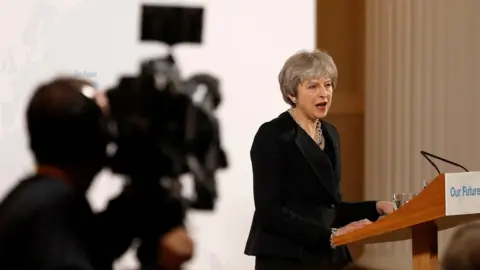 Getty Images
Getty ImagesTheresa May has delivered her long-awaited speech on Brexit, giving more details of what she wants from the UK's future trade arrangements with the European Union.
Here are some of the key lines from the speech.

There was a time when government ministers were suggesting that this was going to be the easiest negotiation in history.
That rhetoric has gone. The prime minister suggested that there would be difficult days ahead, and inevitable points of disagreement.
The bottom line is that Mrs May still intends to take the UK out of the single market and the customs union.
But she emphasised that both sides stand to gain from the successful negotiation of a new partnership, whereas the EU still sees Brexit not as a win-win but as a lose-lose.
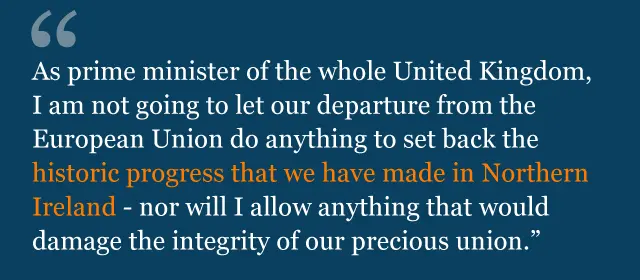
After the uproar of the past couple of days, the prime minister decided that she needed to address Northern Ireland early on.
It was a re-statement of what was agreed last December - no hard border with the Republic, but no customs border with the rest of the UK either.
The trouble is there wasn't much detail about how that circle can be squared. Later in the speech she did speak about the use of technology at the border and a streamlined customs arrangement or even a new-style customs partnership (but not a customs union).
Scepticism about the UK position in Dublin, and elsewhere in Europe, won't have eased all that much.
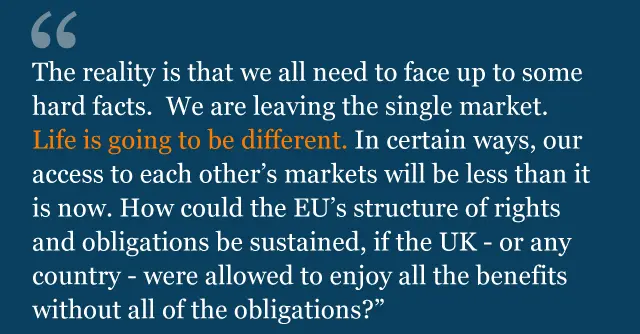
Yes, the prime minister says to the EU, you have a point - we can't just pick off the good bits (although there will be those who argue that she tries to do just that later in the speech).
But there was an honest appraisal here of the "hard facts" - notably that market access will be less than it is now, and that the UK will still have to take account, in some respects, of the rulings of the European Court of Justice.
It was a realistic appraisal of where any successful negotiation is likely to end. On the other hand, the prime minister insisted that the UK will still want to demonstrate that it has taken back control of its money, its border, and its laws.
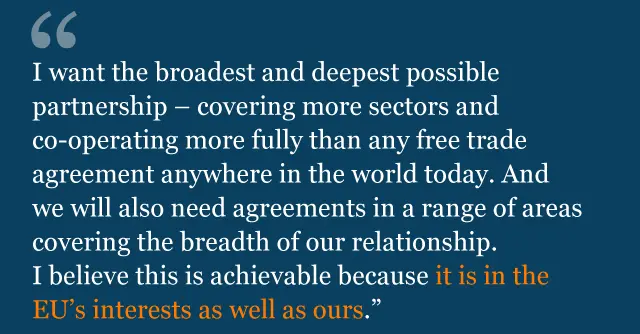
There's nothing wrong with being ambitious, but there will be those who point out that the broadest and deepest possible partnership anywhere in the world today is enshrined in the EU's single market and customs union.
It was striking in this speech how much of the current relationship Mrs May wants to keep - staying close, for example, to EU regulatory agencies, to environmental and consumer protection laws, and to EU policies on state aid and fair competition.
But the prime minister also reserved the right to diverge from EU policies where necessary. In Brussels and elsewhere, that will still be seen as cherry-picking, and will be unacceptable to EU negotiators who are determined to protect the integrity of the single market.
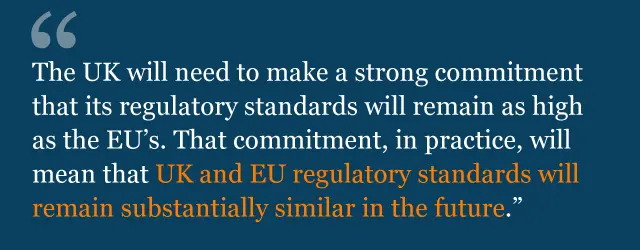
This was important. A bonfire of EU regulations is not going to happen. And if the UK can successfully negotiate a new model of associate membership of EU agencies, that regulate chemicals, pharmaceuticals and the aviation industry, large sections of UK business will breathe a sigh of relief.
Mrs May offered to pay for access to these agencies, and much of the expertise the EU relies upon is based in the UK. But there will still be disagreements about judicial oversight and the role of the European Court of Justice.
It is another reminder of how much there is to negotiate in an extraordinarily short period of time, and why a transition period after Brexit will be so important.
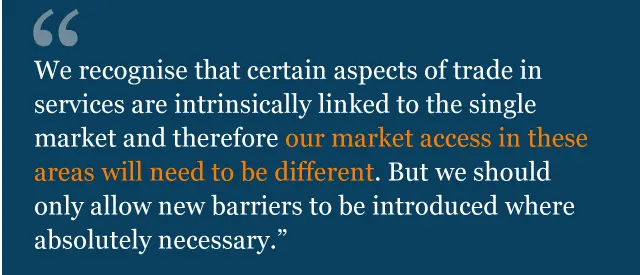
Mrs May called for a bold and creative agreement on services - a sector of over-riding importance to the UK economy.
She mentioned two sectors in particular - broadcasting and financial services - that have never been properly covered in a free trade agreement before.
Her argument is a familiar one - restricting access in all areas of economic activity will hurt you as much as it hurts us.
She spoke of the UK and the EU maintaining the same regulations over time while accepting there would be "consequences" (loss of market access) if the UK chose a different path.
On the one hand, it doesn't sound like "ambitious managed divergence" and that may not be acceptable to some supporters of Brexit in the UK.
On the other hand, it does mean the UK sticking to some EU rules and not others - and that will not be acceptable in other capitals around Europe.
Or as the prime minister said in her speech: "This is a negotiation and neither of us can have exactly what we want."



